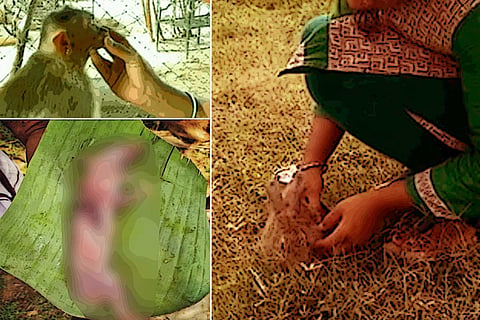

On April 23, the Forest Department in Tamil Nadu’s Trichy arrested six youth in Solaiammapatti village near Valanadu for hunting a monitor lizard, killing it and consuming its meat. A case under the Wildlife Protection Act, 1972 was filed and the group of men between 25 and 30 years of age has been remanded for killing the monitor lizard, which comes under Schedule-I of the species.
This crime could have slipped past the Forest Department’s radar, especially during this lockdown. But, the tip-off came in an unexpected form.
“We received a TikTok video showing a group of men cooking and eating a monitor lizard at a secluded spot. We then tracked them down in a couple of days,” District Forest Officer (DFO) D Sujatha told TNM. “We will not be able to go into details,” she quickly added when enquired about their modus operandi.
In Tirunelveli, forest officials warned three persons on April 23 and 25 for posting TikTok videos that showed them hunting animals like hare with Rajapalayam dogs. In Tirunelveli district alone, six such cases have come to the attention of the Forest Officer, between April 1 and May 11. In Trichy, two such cases have come to light since the beginning of May.
Trail with bread crumbs
Earlier last week in Madurai, college student Geetha* came across a graphic image of a skinned rodent-like animal on her Instagram, posted by a user. She immediately alerted an animal activist, who in turn filed a complaint with the District Forest Officer.
“I scrolled down this person’s Instagram profile and noticed a picture of an Indian Cormorant (a bird), held by its neck, and a meat emoji in the post description. This post is from two years ago. There is also a picture of another exotic looking bird, for which he has used the same smiley. This makes one wonder if he killed the birds and consumed their meat,” said Geetha.
TNM reached out to Madurai’s DFO, who is currently investigating the case. “We were able to obtain his name and find out his contact details. The investigation is still going on. While we have not been able to confirm the details yet, if it is true that he has hunted the bird, then appropriate action will be taken,” said Madurai DFO S Anand.
While in this case, the officials were able to track down the man’s details from his social media ID, in most cases, they are on a wild goose chase. “In fact, many such posts and videos from social media apps like TikTok, Instagram and Facebook have come to our attention in the recent past, especially since the lockdown began,” said the DFO.
He gave an example of a woman who uploaded a video of herself, showing off her pet tortoise at home. “In the video, we can see that she has Parakeets in a cage in the background. We got this from a Facebook group and in one of the comments, another woman has shared that she has been taking care of a tortoise at home for the past seven years,” DFO Anand explained.
The parakeets and tortoise are protected species and are listed under the Wildlife Protection Act, 1972. Holding them in captive or selling them is an offence.
“We don't know who this person is or what their details are but this is happening statewide,” he added.
Ao Limatoshi, Tamil Nadu Assistant Principal Chief Conservator of Forests (APCCF) of Protection, Vigilance and Forests, Wild Life Crime Bureau, explained that such information gained via social media does not usually disclose the person’s identity. “We search for clues, for a vehicle number plate, or a poster or a shop’s display name in the background. Tracking that itself is a time-consuming exercise,” he said.
Rise in such activities during lockdown
Limatoshi noted that such illegal activities are on the rise ever since the lockdown began mainly because people are at home.
“In such cases, the offenders are usually young men, trying to create an impression of their bravery. Their intention is not trafficking and this is a new behaviour. Possibly, after lockdown, we will have to discuss it with the forest officers,” he told TNM.
DFO Anand pointed out that addiction to social media and staying at home could be a reason for people to indulge in such crimes. “People who are addicted to social media have the habit of portraying themselves as fun. So they tend to show off unauthorised pets, going to unauthorised places, handling animals there and posting it on social media. But all this is only in the rural areas bordering the forests,” he pointed out.
APCCF Limatoshi also added that people can report wildlife crimes on the toll-free helpline number: 18004254409 . In addition to a dedicated network of informants, the department also has an active watch on social media apps for busting wildlife crimes.